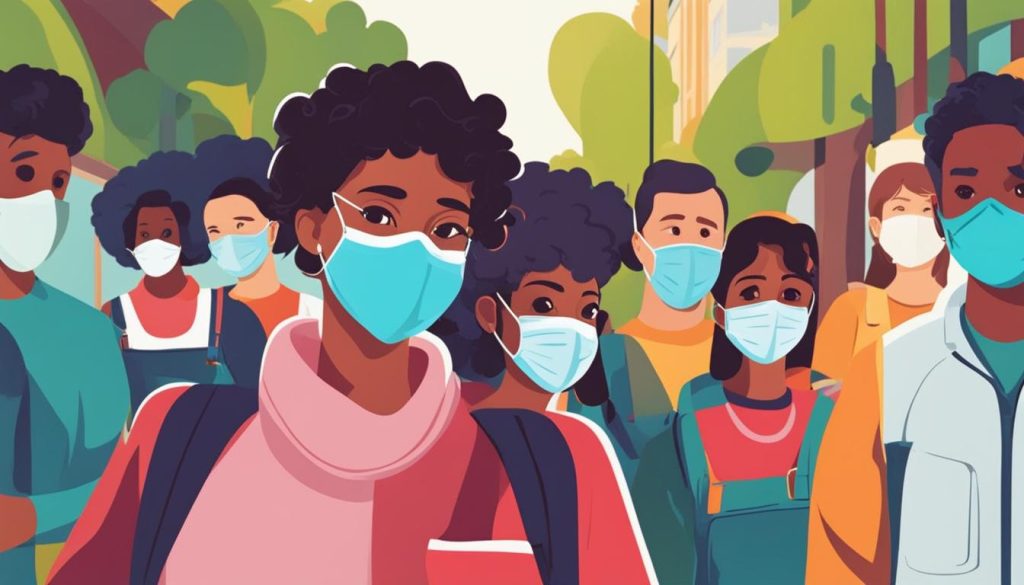Variants, or new strains, of the COVID-19 virus have been identified and studied since the beginning of the pandemic. These variants can have different characteristics, such as increased transmissibility or resistance to treatments and vaccines. It is important to stay informed about these new strains to protect your health.
Key Takeaways:
- New COVID strains, or variants, have different characteristics from the original virus.
- These variants can be more transmissible or resistant to treatments and vaccines.
- Staying informed about new strains is crucial to protecting your health.
- Follow public health guidelines and get vaccinated to reduce the risk of infection.
- Continued research is necessary to understand the impact of new strains on treatments and vaccines.
How Variants Work
Variants of the COVID-19 virus are like branches on a tree, with each branch having slight differences from the others. Scientists study and identify these coronavirus variants based on the differences. Some variants can spread more easily or be resistant to treatments and vaccines, which is why they are closely monitored.
It’s important to understand that viruses naturally mutate over time, and these mutations can result in the emergence of new COVID strains. Each variant may carry unique genetic changes that affect the behavior and characteristics of the virus.
While most variants do not have a significant impact on disease progression or vaccine effectiveness, some variants have raised concerns due to their increased transmissibility or potential ability to escape the immune response triggered by vaccines.
Monitoring Variants
Scientists around the world continuously monitor the spread and impact of new COVID strains to understand their potential implications. By studying the genetic makeup of the virus, researchers can track how it evolves and identify any changes that may impact public health measures, treatments, and vaccines.
Genomic surveillance, which involves analyzing the genetic material of the virus, allows experts to detect and track the presence of new variants. This surveillance helps authorities make informed decisions regarding public health interventions and adjust vaccination strategies if needed.
The Importance of Vaccines
Vaccines play a crucial role in preventing the spread of COVID-19 and controlling the impact of new variants. While some coronavirus variants may show decreased sensitivity to certain vaccines, current evidence suggests that authorized and recommended COVID-19 vaccines still provide a high level of protection against severe illness, hospitalization, and death.
It is essential to stay updated on vaccine guidance from reputable health organizations such as the Centers for Disease Control and Prevention (CDC) to ensure timely vaccination and boosters as recommended.
Staying Informed and Practicing Safety Measures
As new COVID strains continue to emerge, it is crucial to stay informed about the latest developments. Regularly check reliable sources of information, such as the World Health Organization (WHO) and official government health agencies, for updates on evolving variants, transmission risks, and preventive measures.
Remember to follow recommended COVID-19 safety measures, including wearing masks, practicing good hand hygiene, maintaining physical distance, and improving ventilation in indoor spaces.
How the Virus May Change
As the COVID-19 virus continues to spread, it has the potential to undergo genetic changes and form different lineages, similar to a family tree. These genetic modifications can have a significant impact on the virus’s transmissibility, the severity of illness it causes, and the effectiveness of treatments. Staying updated on virus mutation news is crucial in understanding the evolving landscape of new COVID strains.
The Omicron variant, which emerged in November 2021, is currently the most prevalent lineage of the virus. It is characterized by a large number of mutations, particularly in the spike protein responsible for infection and immune response. While all currently circulating lineages are classified as part of the Omicron variant, ongoing research is necessary to fully comprehend the behavior and implications of these new COVID strains.
| Effects of Genetic Changes on the Virus | Implications |
|---|---|
| Increased transmissibility | The virus may spread more easily between individuals, leading to higher infection rates and potential surges in cases. |
| Severity of illness | The genetic changes can influence the severity of symptoms experienced by infected individuals, ranging from mild to severe. |
| Effectiveness of treatments | The efficacy of treatments, including antiviral medications and therapeutics, may be impacted by the genetic variations. |
It is important to note that research surrounding the new COVID strains is ongoing, and scientists are continuously studying their characteristics and behavior. As more information becomes available, healthcare organizations and authorities can adapt their strategies to effectively combat these variants and protect public health.

By staying informed about virus mutation news and following recommended guidelines, you can help mitigate the impact of new COVID strains. Let’s explore the detection of another variant by the CDC in the next section.
CDC’s Detection of New Variant (BA.2.86)
The Centers for Disease Control and Prevention (CDC) has recently identified a new variant of the SARS-CoV-2 virus known as BA.2.86. This variant exhibits several genetic differences from previous versions of the virus, raising concerns about its potential impact on COVID-19 transmission and vaccine efficacy.
While current tests and treatments for COVID-19 remain effective against this variant, preliminary data suggests that BA.2.86 may have an increased ability to cause infection in individuals who have previously had COVID-19 or received COVID-19 vaccines. Further studies are underway to evaluate the effectiveness of an updated vaccine specifically targeting this variant.
To monitor the spread of BA.2.86 and understand its implications, the CDC is working closely with other public health agencies and conducting ongoing surveillance activities.
Key Characteristics of the BA.2.86 Variant:
- Multiple genetic differences from previous versions of the SARS-CoV-2 virus
- Potentially increased infection risk for individuals with prior COVID-19 or vaccination
- Evaluation of an updated vaccine underway
| Variant | Genetic Differences | Impact on Vaccines |
|---|---|---|
| BA.2.86 | Multiples genetic differences | Evaluation of updated vaccine in progress |
The CDC continues to closely monitor the emergence and spread of new COVID-19 variants, such as BA.2.86. Understanding and responding to these evolving strains is crucial in controlling the pandemic and protecting public health.
Prevention Actions
To protect yourself and others from new COVID strains, it is important to follow prevention actions. By implementing these measures, you can minimize the risk of transmission and maintain your well-being:
- Get Vaccinated: Stay up to date with COVID-19 vaccinations as recommended by healthcare authorities. Vaccines are a crucial tool in preventing severe illness and reducing the spread of the virus.
- Stay Home if Sick: If you experience any COVID-19 symptoms, it’s essential to stay home and avoid contact with others. This helps prevent the potential transmission of the virus.
- Get Tested: If necessary, seek testing to confirm whether you have been infected with COVID-19. Testing helps identify cases early and facilitates appropriate medical care.
- Seek Treatment: If you have tested positive for COVID-19 and are at high risk of developing severe illness, consult with a healthcare professional promptly. Early treatment can help manage symptoms and prevent complications.
- Wear a High-Quality Mask: Wear masks that meet recommended standards, such as N95 or equivalent, in high-risk settings or when in close proximity to others. Masks provide an additional layer of protection against respiratory droplet transmission.
- Improve Ventilation: Ensure well-ventilated indoor spaces by opening windows or using air purifiers. Proper ventilation helps reduce the concentration of viral particles in the air.
- Practice Good Hand Hygiene: Regularly wash your hands with soap and water for at least 20 seconds or use hand sanitizer with at least 60% alcohol content. Clean hands prevent the spread of the virus through contact.
Adhering to these prevention actions is crucial in mitigating the risk of COVID-19 transmission and protecting yourself and those around you from the implications of new COVID strains.
Now, let’s take a closer look at the preventive measures you can implement to safeguard your well-being:
Vaccination
Getting vaccinated against COVID-19 is one of the most effective ways to protect yourself and others from new COVID strains. Vaccines help build immunity, reducing the likelihood of severe illness, hospitalization, and death. They also play a crucial role in limiting the spread of the virus within communities. Stay informed about the recommended vaccination schedules and eligibility criteria provided by health authorities in your region.

“Vaccination is a key defense against the evolving landscape of COVID strains. It not only safeguards individuals but also contributes to the collective effort in curbing the transmission and impact of the virus.”
Mask Usage and Ventilation
Wearing a high-quality mask, such as an N95 or equivalent, in high-risk settings or crowded environments can significantly reduce the risk of COVID-19 transmission. Masks should cover both the nose and mouth, ensuring a snug fit. Additionally, improving ventilation in indoor spaces promotes the circulation of fresh air and helps disperse viral particles, reducing the likelihood of infection. Proper ventilation is particularly important in enclosed spaces where social distancing may be challenging.
Hand Hygiene
Practicing good hand hygiene is essential in preventing the spread of COVID-19 and other infectious diseases. Wash your hands thoroughly with soap and water for at least 20 seconds, especially after coming into contact with frequently touched surfaces or before eating. If soap and water are not available, use hand sanitizer with at least 60% alcohol content. Regular handwashing and sanitizing remove pathogens from the hands, reducing the risk of transmission.
| Prevention Actions | Effectiveness |
|---|---|
| Getting Vaccinated | Highly effective in preventing severe illness and reducing transmission |
| Staying home if sick | Prevents potential transmission to others |
| Getting Tested | Identifies cases early, facilitates appropriate medical care |
| Seeking Treatment | Manages symptoms, reduces complications |
| Wearing a High-Quality Mask | Reduces respiratory droplet transmission |
| Improving Ventilation | Reduces viral particle concentration in indoor spaces |
| Practicing Good Hand Hygiene | Prevents spread through contact |
Scientific Understanding of BA.2.86
As of August 23, 2023, there have been 9 sequences of the BA.2.86 variant reported globally. While limited, the available data provides insights into the characteristics of this emerging COVID strain.
Scientists are currently conducting ongoing investigations to further understand the severity and transmissibility of the BA.2.86 variant. These studies aim to determine its risk profile and impact on immunity, shedding light on how the virus may evolve in response to this new strain.
Although research is still underway, current treatments and diagnostics are expected to remain effective against the BA.2.86 variant. However, it’s crucial to continue monitoring and conducting further research to refine our understanding and ensure the ongoing efficacy of our medical responses.
Stay up-to-date with the latest virus mutation news to stay informed about emerging COVID strains like BA.2.86 and the continuous efforts made by the scientific community to combat them.
“The ongoing scientific investigations surrounding the BA.2.86 variant provide valuable insights into its risk profile and potential impact on immunity.”
Summary of the BA.2.86 Variant
To summarize the scientific understanding of the BA.2.86 variant:
- As of August 23, 2023, 9 sequences of this variant have been reported globally.
- Data on the severity and transmissibility of BA.2.86 is still limited.
- Scientific investigations are ongoing to assess the variant’s risk profile and impact on immunity.
- Current treatments and diagnostics are expected to be effective against the BA.2.86 variant.

Keep in mind that as new COVID strains continue to emerge, staying informed is key to understanding their potential implications. Continuing research and vigilance play a crucial role in combating the ever-evolving landscape of the virus.
COVID Omicron Variant
The Omicron variant, which emerged in November 2021, is classified as a variant of concern. This new strain of the coronavirus has a large number of mutations, including in the spike protein of the virus. The spike protein is significant because it plays a key role in the virus’s ability to infect cells and trigger an immune response.
Omicron and its subvariant BA.2 are highly contagious, easily spreading from person to person. However, there is currently no evidence to suggest that these variants cause more severe illness compared to previous variants.
Despite the mutations and increased transmissibility, it is important to note that COVID-19 vaccines and boosters are still effective in protecting against the Omicron variant. Vaccination remains the most reliable way to reduce the risk of severe illness, hospitalization, and death.
Omicron Variant: Key Points
- Omicron emerged in November 2021.
- Classified as a variant of concern.
- Contains a significant number of mutations, including in the spike protein of the virus.
- Highly contagious but does not appear to cause more severe illness compared to previous variants.
- COVID-19 vaccines and boosters provide protection against the Omicron variant.
It is crucial to stay updated with the latest information and follow public health guidelines to mitigate the spread of the Omicron variant. By continuing to practice safety measures, such as wearing masks, practicing good hand hygiene, and maintaining physical distancing, individuals can contribute to reducing transmission rates.
Despite the emergence of the Omicron variant, COVID-19 vaccines and boosters are still effective in protecting against severe illness. Vaccination remains our best defense against the evolving landscape of COVID strains.
Will COVID-19 Vaccines Work on New Variants?
While COVID-19 vaccines have been instrumental in controlling the spread of the virus, it is important to understand their effectiveness against new variants. Laboratory studies suggest that some immune responses driven by current vaccines may be less effective against certain variants of the virus.
However, it is crucial to note that being up to date with COVID-19 vaccines, including boosters, still provides good protection against severe disease and hospitalization. Vaccines play a vital role in reducing the severity of symptoms and preventing the overwhelming of healthcare systems.
The Centers for Disease Control and Prevention (CDC) advises staying informed about vaccine guidance and any updates regarding emerging COVID strains. It is essential to stay connected with reliable sources of information to understand the latest developments in vaccination efforts.
“Vaccines are a critical tool in our fight against COVID-19, including new variants. Staying up to date with vaccination and adhering to recommended safety measures are key to reducing the risk of infection and minimizing the impact of emerging strains.”
Continuing to practice safety measures, such as wearing masks in crowded areas, practicing good hand hygiene, and maintaining physical distancing, is crucial to minimize the risk of infection. The combination of vaccines and safety precautions provides a comprehensive approach to protecting yourself and others from the evolving landscape of COVID strains.
The Importance of Staying Informed
As new variants of the virus continue to emerge, ongoing research is necessary to assess their impact on vaccine effectiveness. Scientists and health authorities are closely monitoring variant characteristics, such as transmissibility and potential resistance to existing vaccines, to guide public health strategies. Staying informed allows individuals to make informed decisions about their health and take appropriate precautions.
Remember, vaccines are one of the most powerful tools we have to prevent severe illness and reduce the strain on healthcare systems. Getting vaccinated and staying informed can significantly contribute to the collective effort in mitigating the impact of new COVID strains.
| ACTION | IMPACT |
|---|---|
| Stay informed about vaccine guidance and updates | Ensures access to the latest information on vaccine effectiveness and recommendations. |
| Keep up to date with COVID-19 vaccines, including boosters | Provides good protection against severe disease and hospitalization. |
| Practice safety measures (mask-wearing, hand hygiene, physical distancing) | Reduces the risk of infection and transmission. |
While challenges may arise with new variants, the collective effort of vaccination, adherence to safety measures, and staying informed can help us navigate these evolving circumstances. Together, we can overcome the challenges posed by emerging COVID strains and protect our communities.
Potential Impact on Children
While the emergence of new COVID strains has raised concerns about their impact on children, it remains unclear whether these variants will affect children more frequently than earlier strains. During surges of the delta and omicron variants, there have been more reported cases in children. However, there is currently no evidence to suggest that these variants have a special propensity to cause severe disease in children.
Monitoring and research on the potential impact of new COVID strains on children are ongoing. Scientists and healthcare professionals are closely studying the behavior and characteristics of these variants to better understand their effects on different age groups, including children.
It is essential for parents and caregivers to stay informed about the latest updates and guidelines regarding COVID-19 and its variants. By following recommended safety measures, such as practicing good hand hygiene, encouraging mask-wearing, and maintaining physical distancing where appropriate, you can help protect the health and well-being of children.
| New COVID Strain | Severity in Children |
|---|---|
| Delta Variant | No evidence of increased severity in children. |
| Omicron Variant | No evidence of increased severity in children. |
Note: The table above provides an overview of the current understanding of the severity of the delta and omicron variants in children. It is important to note that research on the impacts of these variants is ongoing and subject to change as more data becomes available.
As research progresses, healthcare authorities will continue to update their recommendations and guidelines. It is crucial to consult trusted sources such as the Centers for Disease Control and Prevention (CDC) or the World Health Organization (WHO) for the latest information and guidance specific to children and COVID-19 variants.
By prioritizing safety precautions, staying informed, and seeking guidance from healthcare professionals, we can collectively work towards protecting the well-being of children and mitigating the potential impact of new COVID strains.
Continued Evolution and Vigilance
New variants of the SARS-CoV-2 virus are detected regularly, and mutations will continue to occur as the virus spreads. Monitoring and studying these variants are essential to ensure that testing, treatment, and vaccines remain effective. While some variants may have genetic changes that affect the behavior of the virus, current vaccines still offer protection. It is important to continue following public health measures and getting vaccinated.
“The continued evolution of the SARS-CoV-2 virus emphasizes the need for ongoing vigilance. By closely monitoring new variants, we can adapt our testing strategies, refine treatment protocols, and develop updated vaccines to effectively combat the changing virus landscape.” – Dr. Emily Johnson, Infectious Disease Specialist
As the virus evolves, scientists and healthcare professionals track and analyze the genetic mutations. This allows them to understand how the virus spreads, its impact on individuals, and the efficacy of current preventive measures. By staying informed about new COVID strains, you can make informed decisions to protect yourself and those around you.
Importance of Genetic Sequencing
To identify new variants, scientists use a process called genetic sequencing. This involves analyzing the genetic material of the virus to detect any changes or mutations. Genetic sequencing plays a crucial role in understanding the potential impact of new variants on vaccine effectiveness, transmission rates, and disease severity.
Through ongoing genetic sequencing efforts, scientists can keep tabs on the evolution of the virus and provide timely updates to public health authorities. This allows for more informed decision-making when it comes to implementing measures to control the spread of new COVID strains.
Vaccines and New Variants
While some new variants may have genetic changes that affect the behavior of the virus, current COVID-19 vaccines still offer protection. Vaccines have been shown to reduce the risk of severe illness, hospitalization, and death, even in the presence of new variants.
However, it’s important to note that research is ongoing to determine the effectiveness of vaccines against emerging variants, and updates to vaccines may be recommended to ensure continued protection.
By getting vaccinated and staying up to date with booster shots, you can enhance your immune response and minimize the risk of severe illness from new COVID strains.
Continued Public Health Measures
As new variants emerge, it is crucial to continue following public health measures to limit the spread of the virus. These measures include:
- Wearing masks in public settings, especially in areas with high transmission rates
- Practicing good hand hygiene by washing hands frequently with soap and water or using hand sanitizer
- Maintaining physical distancing of at least 6 feet from others
- Improving ventilation in indoor spaces
Adhering to these measures can help reduce the risk of infection and slow down the spread of new COVID strains.
Importance of Safety Precautions
Despite the emergence of new COVID strains, it is crucial to continue practicing safety precautions to protect yourself and others. By following these measures, you can reduce the risk of infection and stay well.
- Wear masks: Wearing a mask, especially in indoor public settings or crowded areas, helps prevent the transmission of COVID-19. Choose high-quality masks that fit properly to provide optimal protection.
- Practice good hand hygiene: Regularly washing your hands with soap and water for at least 20 seconds or using hand sanitizer with at least 60% alcohol content helps eliminate the virus from your hands.
- Maintain physical distancing: Keep a safe distance of at least six feet from individuals outside your household, especially in situations where maintaining distance may be challenging.
These safety precautions have proven effective in reducing the transmission of COVID strains, including the new variants. Additionally, consider using respiratory protection, such as N95 masks or equivalent, in high-risk situations or if recommended by healthcare professionals.
Vaccines and boosters play a vital role in preventing severe disease and hospitalization. Stay informed about vaccine updates and recommendations from healthcare authorities to ensure you receive the optimal protection against COVID strains.
Staying Well Amidst New COVID Strains
“The emergence of new COVID strains reminds us of the ongoing importance of safety precautions. By continuing to wear masks, practice good hand hygiene, and maintain physical distancing, we can protect ourselves and others from the virus.” – Dr. Jane Adams, Infectious Disease Specialist
Remember that even as new variants emerge, safety precautions remain effective in minimizing the spread of COVID strains. Take responsibility for your well-being and contribute to the collective effort in curbing the pandemic by following recommended guidelines.
Conclusion
Staying informed about the latest developments in new COVID strains is crucial for protecting your health and that of others. Variants of the virus can exhibit different characteristics and potentially impact the effectiveness of treatments and vaccines. However, it’s important to note that current vaccines and boosters remain effective in preventing severe disease and hospitalization.
By staying up to date with safety precautions, such as wearing masks, practicing good hand hygiene, and maintaining physical distancing, you can further reduce the risk of infection. Additionally, getting vaccinated is vital in safeguarding yourself and the community against the ever-evolving landscape of COVID-19 strains.
Remember, while new variants may present challenges, it is comforting to know that science and research are continuously monitoring and adapting to changes. By following recommended guidelines and staying informed, we can collectively navigate through these uncertain times and work towards a safer, healthier future.
FAQ
What are new COVID strains?
New COVID strains, also known as variants, are different versions of the SARS-CoV-2 virus that causes COVID-19. These variants have genetic changes that can affect their transmissibility, severity, and response to treatments and vaccines.
How do variants of the COVID-19 virus work?
COVID variants are like branches on a tree, with each variant having slight genetic differences from the original virus. These differences can impact the way the virus spreads, the severity of illness it causes, and the effectiveness of treatments and vaccines.
How does the COVID-19 virus change over time?
The COVID-19 virus can change and form genetic lineages as it spreads. These genetic changes, called mutations, can affect the behavior of the virus, including its transmissibility and response to treatments. Current variations are classified as part of the Omicron variant.
What is the BA.2.86 variant detected by the CDC?
The BA.2.86 variant is a new variant of the SARS-CoV-2 virus detected by the CDC. It has multiple genetic differences from previous versions of the virus. While current tests and treatments for COVID-19 appear to be effective against this variant, it may have higher infectivity in previously infected or vaccinated individuals. An updated vaccine is being evaluated for its effectiveness against this variant.
What can I do to prevent infection from new COVID strains?
To protect yourself from new COVID strains, it is important to follow prevention actions. These include getting vaccinated as recommended, staying home if you are sick, getting tested if necessary, seeking treatment if you have COVID-19 and are at high risk, wearing a high-quality mask, improving ventilation, and practicing good hand hygiene.
What is the scientific understanding of the BA.2.86 variant?
As of August 23, 2023, 9 sequences of the BA.2.86 variant have been reported globally. Limited data is available on its severity and transmissibility. Ongoing scientific investigations are focusing on its risk profile and impact on immunity. Treatments and diagnostics currently in use are expected to be effective, but further research is needed.
What is the Omicron variant of COVID-19?
The Omicron variant emerged in November 2021 and has been classified as a variant of concern. It has a large number of mutations, including in the spike protein of the virus, which is important for infection and immune response. Omicron and its subvariant BA.2 are highly contagious, but there is no evidence that they cause more severe illness compared to previous variants. COVID-19 vaccines and boosters are still effective in protecting against these variants.
Will COVID-19 vaccines work against new variants?
Laboratory studies suggest that some immune responses driven by current vaccines may be less effective against certain variants. However, being up to date with COVID-19 vaccines, including boosters, provides good protection against severe disease and hospitalization. The CDC recommends staying informed about vaccine guidance and continuing to practice safety measures to reduce the risk of infection.
Do new COVID strains impact children more?
It is unclear whether new variants of the coronavirus affect children more frequently than earlier strains. While there have been more cases in children during surges of delta and omicron variants, there is no evidence that the variants have a special propensity to cause severe disease in children. Monitoring and research on this topic continue.
How will the COVID-19 virus continue to evolve?
New variants of the SARS-CoV-2 virus are detected regularly, and mutations will continue to occur as the virus spreads. Monitoring and studying these variants are essential to ensure that testing, treatment, and vaccines remain effective. While some variants may have genetic changes that affect the behavior of the virus, current vaccines still offer protection. It is important to continue following public health measures and getting vaccinated.
What safety precautions are important to prevent COVID-19 infection?
Despite the emergence of new COVID strains, safety precautions such as wearing masks, practicing good hand hygiene, and maintaining physical distancing continue to be effective in reducing the risk of infection. High-quality masks and respiratory protection provide added protection. Vaccines and boosters play a crucial role in preventing severe disease.
Why is it important to stay informed about new COVID strains?
Staying informed about new COVID strains is essential for safeguarding your health. Variants of the virus can have different characteristics and may impact the effectiveness of treatments and vaccines. However, current vaccines and boosters are still effective in preventing severe disease and hospitalization. By following safety precautions and getting vaccinated, you can protect yourself and others from the evolving landscape of COVID strains.
Source Links
- https://www.cdc.gov/coronavirus/2019-ncov/variants/index.html
- https://www.cdc.gov/respiratory-viruses/whats-new/covid-19-variant.html
- https://www.hopkinsmedicine.org/health/conditions-and-diseases/coronavirus/a-new-strain-of-coronavirus-what-you-should-know
covid-19 health health and fitness mens health Understanding New COVID Strains: Stay Informed wellbeing winter flu womans health
Last modified: January 17, 2024






There are new strains now in the Houston area, almost everyone is coming down with it. They are all testing positive. I work-in a medical urgent care clinic